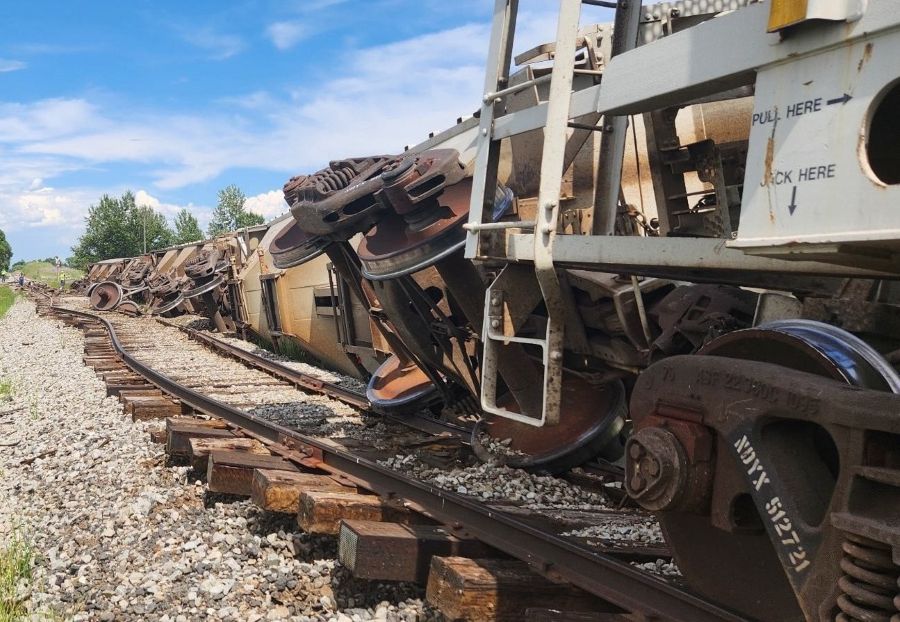Major Train Derailment Near Chester Spills Tons of Wheat, Closes Key Intersection Indefinitely
Train Derailment in Chester: A Major Disruption and Environmental Concerns
A serene Tuesday afternoon turned chaotic in the small town of Chester, Idaho, as a train derailment near a busy intersection resulted in the spillage of thousands of pounds of wheat and left a significant mess in its wake. The incident, which took place just before 4 p.m. at the intersection of 2900 East and U.S. Highway 20, saw four grain cars belonging to Eastern Idaho Rail jump the tracks while transporting agricultural goods primarily focused on Idaho’s rich harvests of wheat and potatoes.
What Happened?
The derailment halted operations along a vital shortline track used for transporting locally grown crops to Ashton, where the railway line ends. According to Fremont County Chief Deputy Cody Gudmonson, it was a "significant mess," but fortunately, no injuries were reported. The clean-up required after the incident will inevitably impact traffic in the area, both for vehicles on the ground and rail traffic above.
The Aftermath: Impact on Traffic and Agriculture
The immediate aftermath of the derailment has resulted in the indefinite closure of the intersection at 2900 East and U.S. Highway 20 due to severe road damage. This situation has posed a considerable inconvenience for local drivers who routinely use this cutoff road. As Deputy Gudmonson pointed out, alternate routes will now be essential for those needing to navigate the area.
“EastIdahoNews.com reports that the cleanup and repair efforts may take as long as a month,” said Assistant Fire Chief Dave Fausett of the South Fremont Fire District. The elevated position of the rail bed, combined with the steep fall from the tracks, has exacerbated the damage.
Key Details of the Incident:
- Time of Incident: Just before 4 p.m. on Tuesday.
- Location: Near 2900 East and U.S. Highway 20, Chester, Idaho.
- Train Owner: Eastern Idaho Rail, which primarily transports wheat and potatoes.
- Number of Cars Derailing: Four grain cars.
- Estimated Cleanup Time: Up to a month.
- Damages: Substantial road damage and spillage of wheat.
From an agricultural standpoint, the derailment has disrupted the movement of essential crops. The impact on freight transportation may resonate beyond just this specific incident, as it has implications for the local economy heavily reliant on the timely transport of agricultural products.
Environmental Concerns and the Cleanup Process
While the immediate focus is on clearing the tracks and reopening the road, environmental considerations arise from the wheat spill. Although wheat itself poses less danger compared to hazardous materials that might be transported by train, the inadvertent spillage does have consequences. Potential concerns include:
- Soil Integrity: Wheat spilling onto the land can affect local soil health and nutrient balance.
- Wildlife Impact: Spillages can attract wildlife, leading to increased road traffic risks.
- Long-Term Agricultural Effects: The cleanliness of the area must be ensured for effective future planting seasons.
Local authorities and environmental agencies are expected to monitor the situation closely to address any potential fallout from the spillage.
What’s Next?
The situation remains fluid, with East Idaho Rail expected to provide updates on their efforts to restore the railway and roadway. As officials work to clean up the wheat and assess the damages, residents in the area are encouraged to stay informed of the latest developments and take precautionary measures when navigating alternate routes.
This derailment highlights the critical role transportation plays in food logistics and the broader agricultural economy in Idaho. As such, it serves as a reminder of the fragility of our supply chains and the unexpected disruptions that can arise from accidents like this one.
In conclusion, while no injuries were reported and the swift response from the local fire district and authorities minimized the situation’s severity, the implications of this train derailment will linger. As Chester’s community navigates the logistical maze that lies ahead, the lessons learned from this incident may prompt a reevaluation of transport protocols for future agricultural freight movements.
Stay Tuned for Updates:
Residents and concerned readers are encouraged to follow EastIdahoNews.com for ongoing updates regarding the cleanup process and any new information related to traffic conditions in the Chester area as repair efforts progress.





